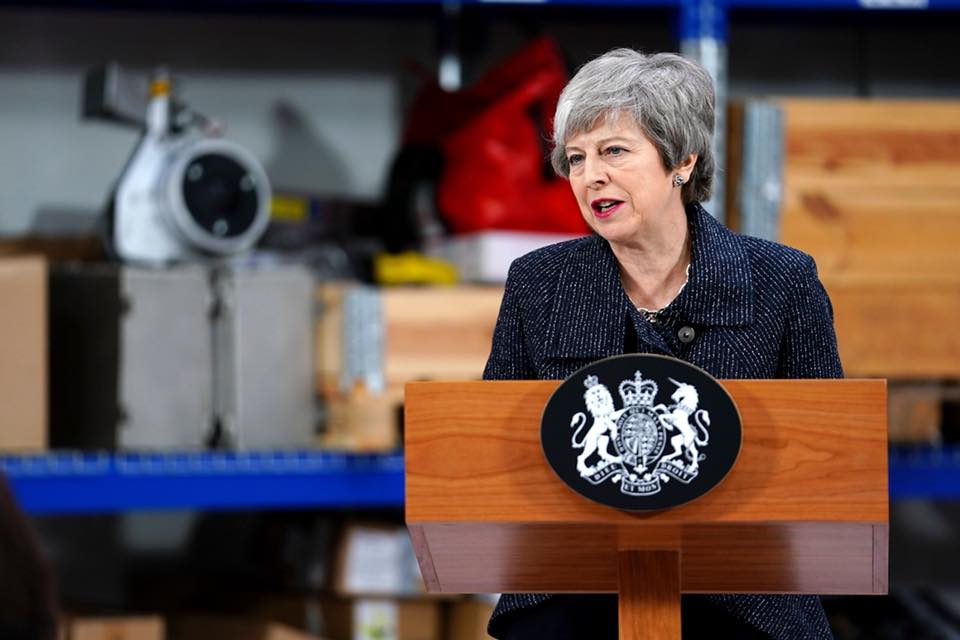
LONDON — Theresa May is set to join the ranks of Conservative prime ministers whose time in office has been overwhelmed — and cut short — by the issue of Europe.
Ever since Edward Heath took the U.K. into what was then the European Economic Community in 1973, the Conservative Party has been anguished by how close the country’s ties should be with the continent.
All of Heath’s Conservative successors in 10 Downing Street — Margaret Thatcher, John Major and David Cameron — have been swamped by Europe. On Wednesday, May told lawmakers from her own party that she will step down once she has secured Britain’s departure from the European Union. Though the actual Brexit date remains clouded in mystery, few expect May to last more than a few more months.
“Throughout my adult lifetime, every Conservative prime minister has been brought down by Europe,” Damian Green, a long-time close associate of May and a former member of her Cabinet, told BBC radio Thursday.
“For a successful political party that represents a very significant part of this country …. that is extraordinary.”
———
EDWARD HEATH, Prime Minister 1970-1974
On taking office, Heath made membership of the EEC a key objective. He was fortunate to have in Georges Pompidou a French president more amenable to the prospect of Britain joining the bloc than his predecessor Charles de Gaulle, who twice in the 1960s vetoed British membership.
In October 1971, the House of Commons voted by a margin of 356 votes to 244 to join the EEC in 1973, with a sizeable chunk of Heath’s own party voting against. Though Heath and the Conservatives were voted out of office a year later after an economic crisis, his passionate pro-European stance weighed against him when Thatcher challenged him for the party’s leadership in 1975.
———
MARGARET THATCHER, Prime Minister 1979-1990
Thatcher was a keen backer of the EEC at first — she even wore a sweater with the flags of the member countries during Britain’s first referendum on membership of the bloc in 1975. But her 11 years in Downing Street were marked by growing opposition to Europe.
Though her government backed the creation of the single European market in the mid-1980s, she became increasingly hostile to the move to further integrate European countries.
The appointment of French socialist Jacques Delors to head the executive European Commission added fuel to her fire. Thatcher and a growing part of the Conservative Party were aghast at Delors’ ambition for a single currency.
In a 1988 speech, Thatcher rejected the prospect of a “European super-state exercising a new dominance from Brussels.” Not everyone in her party was that hostile, and Thatcher’s growing antipathy to Europe prompted the 1990 resignation of her deputy.
In a cricket reference, Geoffrey Howe savaged Thatcher, arguing that she was sabotaging discussions with Europe: “It’s rather like sending your opening batsmen to the crease only for them to find the moment the first balls are bowled, their bats have been broken by the team captain.”
Thatcher’s time was up.
———
JOHN MAJOR, Prime Minister 1990-1997
Her successor, John Major, sought to mend fences with Europe, even while keeping Britain out of the single currency. His government would soon after descend into civil war over the Maastricht Treaty, which bolstered integration on an array of issues, including foreign policy, and led to the creation of what is now known as the European Union.
Many of the hard-line euroskeptic lawmakers who have bedeviled May’s leadership came to the fore during Major’s premiership. John Redwood, one of the more passionate Brexit-backers in Parliament, challenged Major for the leadership of the Conservative Party in 1995. Though he lost overwhelmingly, it was clear that the party was riven by the issue of Europe, both in parliament and beyond.
Hugely divided, the Conservatives, after 18 years in office, suffered one of their worst defeats in history in 1997 in an election that saw Tony Blair lead a decidedly pro-European Labour Party into power. His ambition was to put Britain at the “heart of Europe” and he even indicated a willingness for the country to join the euro, which launched in 1999.
———
DAVID CAMERON, Prime Minister 2010-2016
During the Blair years, the Conservatives became more and more hostile to the EU. But Cameron promised that his party would no longer carry on “banging on about Europe.”
Despite his intention, Cameron couldn’t avoid the issue of Europe when becoming prime minister in 2010, leading a coalition with the far-more pro-European Liberal Democrats. With the U.K. Independence Party making headway with its demand for a fresh vote on Britain’s membership, and its assertion that Britain had ceded too much sovereignty to Brussels, Cameron felt compelled to promise a referendum to bind his party together.
That referendum took place on June 23, 2016 and the British people voted by a margin of 52 per cent to 48 per cent to leave the EU. Cameron resigned the day after and May won the ensuing succession battle on a promise to deliver Brexit.
Nearly three years on, that’s proven more difficult than she could possibly have imagined. And in perhaps her final roll of the dice, she has promised to step down if Parliament backs her twice-rejected Brexit deal.
Whenever she leaves, her successor, whoever he or she is, will likely face the same problems.
“Prediction: the same fate awaits her successor, whoever it is,” Nick Boles, a Conservative lawmaker, tweeted soon after May’s announcement.